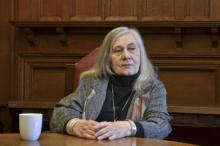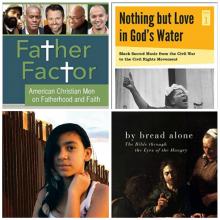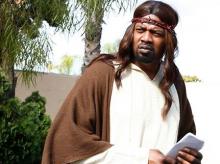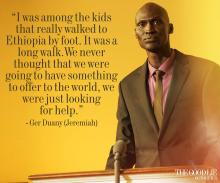Culture
The Jesus of pop culture is multiethnic and well-traveled, pious and irreverent, singing and silent. A fictional portrayal that is blasphemy to one viewer is sacred to another. The diversity of Jesus’ depictions reflects the diversity of the pop culture audience. Most recently, another fictional Jesus has appeared in Compton, smoking weed and promoting “black-Latin” reconciliation in the new comedy Black Jesus. The sitcom presents a Jesus who uses at times crude language to ultimately promote a consistent gospel message of love. While this Jesus “shares in the pleasures” of his largely poor, African-American community, “he also challenges their prejudices, violence, and self-seeking.” Read more in Danny Duncan Collum’s “The Christ of Compton” (Sojourners, November 2014).
Check out this list to read about five portrayals of Jesus in recent pop culture history.
1. Lion Jesus
In The Chronicles of Narnia, C.S. Lewis sets up a less than subtle allegory of Jesus in the form of a lion named Aslan. Aslan transforms a void into a world through song. He welcomes children. He dies and comes back to life. But still, he is a lion, fierce and elusive, helping to convey both the intimidating power and the radical love of Jesus.
“‘Safe?’ said Mr. Beaver; ‘don’t you hear what Mrs. Beaver tells you? Who said anything about safe? ‘Course [Aslan] isn’t safe. But he’s good. He’s the King, I tell you.’” –The Lion, The Witch, and The Wardrobe (1950)

Sunday evening I did something I haven't done in close to 30 years: I went to an actual record store and bought a brand-new U2 album on vinyl, took it home, pulled out the turntable, put on my headphones, sat on the floor, and stayed up way too late reading the liner notes and listening to the songs over and over again.
Lord, how I've missed this particular ritual.
When I was a teenager, late Sunday nights were when I indulged my secret pleasure by listening in bed (clandestinely so as not to incur the wrath of my parents for being awake well past my bedtime) to the "King Biscuit Flower Hour" on WPLR, the classic rock station in New Haven that was one of two (the other being a horrendous pop-40 station) that came in clearly on the FM stereo in my upstairs bedroom.
I listened, religiously, every Sunday night for years, hoping to hear a song by one of the British New Wave bands of which I was fond, or, if I was particularly lucky, by my favorite band on the planet: U2.
Sometimes weeks would go by without hearing a U2 song on those late Sunday nights, my ear pressed to the transistor radio secreted next to the pillow on my twin bed. But then, like a bolt of lightning — I'd hear Bono's voice or Edge's guitar begin to keen. It was a wee bit magical, although in retrospect today I might call it sacred.
All the waiting and listening was worth it. Always.

Boys on a beach,
women with cookpots,
men bombing tender patches of mint.
There is no righteous position.
Only a place where brown feet
touch the earth.
Maybe you call it yours.
Maybe someone else runs it.
What do you prefer?

What are you afraid of? That’s what Pulitzer Prize-winning author Marilynne Robinson asks writers who shy away from writing about faith.
The beloved author has won accolades after writing so openly about belief, but it remains a subject few other writers take on.
“It’s courageous of Robinson to write about faith at a time when associations with religion are so often negative and violent,” Diane Johnson wrote in her New York Times review of Robinson’s latest book, Lila, which was released Oct. 7.
Like its predecessors Gilead (2004) and Home (2008), the new novel takes place in a 1950s Iowa town and focuses on minister John Ames and his family. The story is told from the perspective of his wife — and later, widow — Lila.
Robinson has been able reach varied audiences. A member of the liberal United Church of Christ, she is far from holding up ideals put forward by the religious right, but that hasn’t stopped conservative Christians from engaging with her writing. Earlier, she spoke with Religion News Service about guns, gay marriage, and Calvinism.
Before giving an address at Union Theological Seminary last spring, Robinson also spoke about the tensions between faith and writing. Some answers have been edited for length and clarity.

Paternal Insights
Father Factor: American Christian Men on Fatherhood and Faithoffers diverse perspectives from men under 40 who are rooted in a broad spectrum of Christian traditions, ethnicities, and backgrounds. Edited by R. Anderson Campbell, this is the fifth volume in the I Speak for Myself series. White Cloud Press
Sing Freedom
In Nothing but Love in God’s Water: Volume I, Black Sacred Music from the Civil War to the Civil Rights Movement, gospel music scholar Robert F. Darden explores the sustaining and revolutionary power of sacred song in African-American history. Penn State Press
THE CRY OF the church to the world should be “Forgive us.”
At a time when the American church struggles with finding its place in the world and struggles with asserting its identity, could the church be known as the community that models confession, repentance, and the seeking of forgiveness? At this moment in history, the American church is often ridiculed or portrayed as unforgiving and ungracious. Could the church offer a counter-narrative, not of defensiveness or derision but of an authentic confession and genuine reconciliation? By examining seven different areas where the church has committed sin, we ask the church to consider the spiritual power and the theological integrity of a church that seeks forgiveness for those sins.
Our scriptures testify to the necessity of confession. Confession is central to the Christian faith. The importance of confession arises from the Christian view of sin. Sin is a reality and must be taken seriously. Evangelicals consistently begin our gospel presentation with the centrality of sin to the human experience. American evangelicals often assert that the beginning of the work of God’s forgiveness is the recognition of our need for God because of human sinfulness.
It is antithetical to the gospel when we do not confess all forms of sin—both individual and corporate. The reason evangelicals can claim to be followers of Jesus is because there has been an acknowledgement of sin and the seeking of God’s grace through Jesus Christ that leads to the forgiveness of sin.

CHEF IS A small-budget film with an all-star cast and artful storytelling. Jon Favreau, who also directed Iron Man, stars in his own film as a head chef named Carl Casper at an acclaimed restaurant in Los Angeles. Casper is left in a vocational tailspin after a scathing review and a public meltdown. He loses his inspiration and finds himself in an existential crisis.
In Chef Casper’s quest to recover his culinary mojo, he takes a trip to Miami and buys a used food truck. The film plays on the power of relationships in a messy, winding, but authentic path. Chef Casper’s community—his ex-wife, his son, and his best friend—are invited into the one thing Casper loves to do, demonstrating how community, at its best, can propel us on the way we should go.
Each truck stop on the journey back to California fills Chef Casper with new vision and adds distinctive ingredients. He makes his way to once again bring beauty and flourishing back to his street corner of the world.
My small group at church watched Chef together and bonded over it. We explored themes of vocation—how we can contribute to flourishing through the distinctive things “we’re good at.” And how activism isn’t just about waving the proverbial picket sign; it also can be about loving what we do with great friends.
IN 1998, AWARD-WINNING writer Linda Lawrence Hunt and her husband, Jim, were forced to consider a question no parent wants to ask: How do you find meaning in life after losing your child?
Their 25-year-old daughter, Krista Hunt Ausland, had just died in a bus accident in Bolivia while volunteering with the Mennonite Central Committee.
“Your joys become more intense,” consoled a friend whose family had also lost a child.
This resonated with Linda, especially since Krista was known for her energy and enthusiasm. Linda and her husband, now retired professors of English and history at Whitworth University, had always encouraged Krista to travel and take part in community service, but even they were amazed by the intense joy Krista exuded serving as a school teacher in inner-city Tacoma, Wash., or volunteering in poor communities in Latin America. Writing about that joy might help to recover some of it in Linda’s own life, she thought.
Fifteen years later, Linda’s newest book is more than just an ode to a remarkably happy daughter. Pilgrimage through Loss: Pathways to Strength and Renewal after the Death of a Child is a collection of ideas and insight from more than 30 parents who decide in their darkest hours to “face grief in creative and intentional ways.” The book, which contains study questions at the end of each chapter and references new research on grief, is intended as a resource for grieving parents, as well as for those hoping to support them in the right ways and at the right times. “Closure is an illusion,” explains Linda, but she describes multiple examples of parents finding strength and even joy in sacred spaces and rituals, as well as in giving and receiving symbolic acts of kindness.

HIGHBROW FILM criticism and fanboy comment pages alike often manifest as if their purpose is to make snarky points about who knows how much about what. Whether in an academic journal or on Reddit, film criticism can either get the point or be the point. We can either convince ourselves that we exist to show the world how smart we (think we) are—or to facilitate a conversation about the purpose of art that’s spacious enough to stimulate both the heart and the mind.
The lack of clarity about such purpose means that it has to be continually reasserted, so here goes: The purpose of art is to help us live better. I contend that this is the primary evaluative lens through which we should watch. Of course aesthetics, craft, and content matter, but how I watch films depends at least as much on the notion that art emerges from a human creative impulse that is at its best directed at the common good.
The protagonist of the new documentary The Overnighters has made a similar shift in consciousness regarding his own vocation. North Dakota pastor Jay Reinke understands that the purpose of church isn’t far different from that of art, and he opens his building to economically disenfranchised folk trying to find a job in the oil boom, letting them stay overnight despite local suspicions. It’s a manifestation of Christian vocation mingled with lightly ringing alarm bells—the pastor appears to be a Lone Ranger, not collaborating with supportive church leaders or members; the jobs are in an environmentally degrading industry—and a picture of community service that seems at once miraculous and exhausting.

JESUS RETURNED this past August. Or at least a new depiction of him appeared on late-night cable television, in the comedy Black Jesus, created by Aaron McGruder (of The Boondocks). There was no rapture, and no subsequent tribulation, beyond what passes for normal these days. Instead Jesus appeared, as he did in Palestine, in a manner both obscure and mysterious. And, again, his incarnation became a scandal among some of the powerful and pious.
In Black Jesus, on the Adult Swim network, the second person of the Trinity turns up one day on the streets of Compton, a very poor and heavily African-American community in southern Los Angeles County. Played by a tall and beefy Gerald “Slink” Johnson, Jesus walks the streets in his first century robe and sandals, but with his hair in a Tina Turner perm. Aside from the eccentric get-up, this Jesus fits right into his surroundings. He has no cash, and no place to lay his head. But that goes for plenty of Comptonites. He enjoys malt liquor and marijuana, just as much as he did good wine back in the day at Cana. He’s still preaching and practicing unconditional love, forgiveness, nonviolence, and service to all, but his street talk averages about 1.5 bleeps per sentence.
There’s plenty that’s problematic about Slink Johnson’s character. For one thing, I can’t imagine the Jesus I know using the disrespectful canine term for women so freely or being quite so nonjudgmental about the marijuana trade. But neither does this depiction approach “blasphemy,” which is what the American Family Association called it. The Catholic League, which often leads the charge against perceived offenses to the faith, got it about right when it said, “The Jesus character in this show is a mixed bag: He is irreverent and can be downright crude, but he also has many redeeming qualities.”

These days, female television characters can almost do it all. But we, the media consumers and producers, are still deciding if we should let them make mistakes, too.
And I don’t mean just the I-dated-the-wrong-handsome-doctor mistakes, or the I’m-an-overprotective-mother mistakes. I mean the type of mistakes that warrant the label of antihero. Merriam-Webster defines an antihero as “a protagonist or notable figure who is conspicuously lacking in heroic qualities.” Over the past several years, TV has become saturated with male antiheroes. Breaking Bad made a meth dealer Emmy gold, and Dexter garnered a cult following behind a sociopathic vigilante. But hey, boys will be boys.
Girls will be girls, too, if we let them. And girls aren’t always perfect. John Landgraf, president of FX, says it’s much harder to find acceptance for the female antihero: “It's fascinating to me that we just have really different, and I think, a more rigorous set of standards for female characters than we do for male characters in this society.”

Editor’s Note: ‘Left Behind’ starring Nicolas Cage hits theaters nationwide on Friday, Oct. 3. The film is based on the wildly popular book series and movies of the same title, in which God raptures believers and leaves unbelievers behind to learn follow Jesus and defeat the Antichrist. So how’s the film reboot?
Sojourners Web editors called up a group of religion writers in D.C. to watch and review the movie together. We left with more questions than answers. Here’s our takeaway on all things ‘Left Behind’ — and a little Nic Cage.
Catherine Woodiwiss, Associate Web Editor, Sojourners: So first things first — why Left Behind again?
When the books were published [starting in 1995], there was a debate happening in Christianity over whether Hell was a real, physical place. And the original movies were produced in the context of 9/11 and the Iraq war. So you can look and say, okay, this was a time of questioning what some saw as fundamental beliefs, of war and terrorism. So the popularity of an end-times series makes some sense.
But why now? Why today?

As the Washington, D.C., premiere of Warner Bros.’ new movie, The Good Lie, came to a close, I could barely see the credits through my tears, but the noise of the crowd around me erupting into cheers and the standing ovation was impossible to miss. This film really touched me. I knew I had to write about it.
The Good Lie is the story of some of the "Lost Boys" of Sudan — orphans of war, who walked hundreds of miles fleeing violence, only to spend a decade in a refugee camp before finally being resettled in America. But the film is much more than that. It is a story about the power of faith and regular people who do incredible things because there is no one else who can. It is the story of immigrants — a funny and heartbreaking insight into what it is like to be a stranger in America. And it's a story and performance made all the more real because the Sudanese characters are played by actors who were child refugees and child soldiers themselves.
It stars Reese Witherspoon, whose character and role encapsulate so much of why this movie works. She's the headline draw for Warner Bros., but the movie is not about her. She helps the Lost Boys, but as is so often the case when we respond to God's call to care for our neighbor, they probably help her more. No one saves the day in this movie, but they all help save each other.

A Hymn for This Sunday
This hymn by Carolyn Winfrey Gillette asks the question what does it mean to be a Christian, a church? Whom do we serve? How shall we respond to those in need? It is based on the lectionary passage Matthew 21:23-32 (September 28, 2014). The United Methodist Worship Office has formatted the hymn with the music as a free download.
Once a Father Told His Children
NETTLETON 8.7.8.7 D (“Come, Thou Fount of Every Blessing”)
Once a father told his children,
“Go and do your daily chores.
Go and work out in my vineyard;
All that’s mine will soon be yours.”
One responded, “I won’t do it!”
Then he changed his mind and went.
One said, “Yes! Just send me to it!”
But he went back home again.
...





On September 21, Leonard Cohen Turned 80. With or Without a Cigarette, It’s Time to Celebrate.
“I hope I stay on the road a little bit longer - but you may not be so enthusiastic when you hear my reason. You see I want to start smoking next year when I'll be 80. It's been a long barren time. I think it’s the right age to recommence.” —Leonard Cohen
I dreamed you were in Florence, singing on some stage. Your back was to the men, the women by your sides. Your melody was tranquil, just humming do-re-me-fa, la-fa-re-me-do. And when there was commotion, some men quarreling behind the scene, you turned and faced them calmly, beseeching, “Gentlemen, let’s sing.”
You have left us these past months, ceased your universal tour. It gives us time to miss you, and wonder what you mean. This week you will be eighty, there’s no question, you are old. Your bones may creak or ache and I’ll guess your heart’s a little tired, but from outside looking in you seem settled in a pretty gentle space.
So in the dream your melodies kept coming, like a river from its source. “You’re doing it,” someone shouted. “It’s exactly what we want!” People were casually swaying until your voice started to get hoarse. “Well, I’m glad you like it,” you croaked joyfully, “I call this solemn mingling my little Florentine Prayer.”

Editor's Note: Spoilers ahead! You've been warned.
Over the past eight episodes of The Leftovers, HBO’s latest drama based on Tom Perrotta’s play of the same name, viewers have been treated to a case study in grief and faith in the midst of a life-changing event. Unlike the Left Behind series, which incorporated Christian triumphalism with terrible theology, The Leftovers examines the deeper human and spiritual issues of what would happen were two percent of the population to suddenly disappear. It is powerful and beautiful and really hard to watch (especially Episode Five). It asks the question: does life go on when your world is changed forever?
The show offers a variety of responses to the Sudden Departure of October 14: Kevin Garvey, the police chief who seems to be losing his mind after his wife leaves him for a cult and after his father needs to be committed; Nora Durst, who’s lost her entire family, so she keeps everything exactly as it was when the Sudden Departure occurred; Rev. Matt Jamison, Nora’s brother whose faith has been shaken because he was not taken; the town dogs who have become feral; and finally, the creepiest citizens of Mapleton, the Guilty Remnant, or the GR as they’re “affectionately” known.
This past week’s episode gave us a greater understanding of the GR. Although the nihilistic views of the Guilty Remnant are quite different from those of Christianity, I was struck by their powerful and strategic mission of witness. The cult was formed out of the recognition that everything changed on October 14 and that to pretend otherwise was foolish. The group, in their white clothes, their silence, their stripped-down existence, bears witness to the fact that they are living reminders of what happened. They are fundamentalists about their cause and willing to die for it — even if that death comes from their own hands.